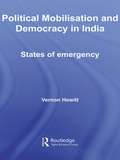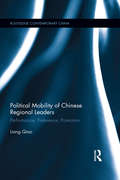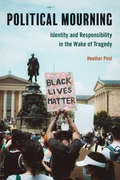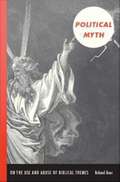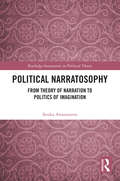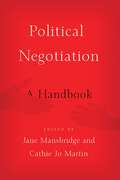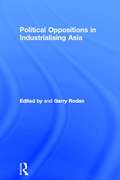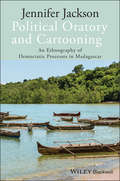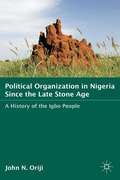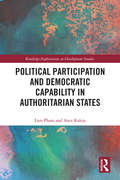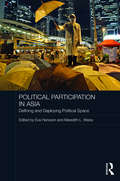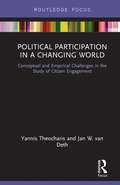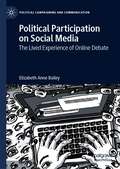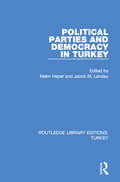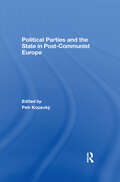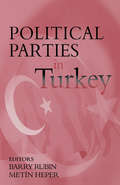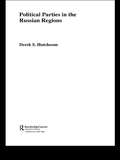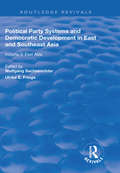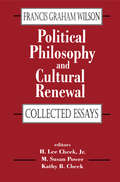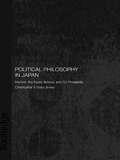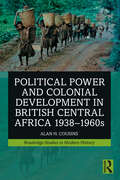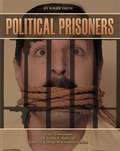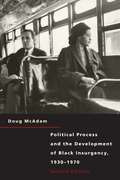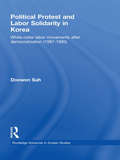- Table View
- List View
Political Mobilisation and Democracy in India: States of Emergency (Routledge Advances in South Asian Studies)
by Vernon HewittThis book addresses the paradox of political mobilization and the failings of governance in India, with reference to the conflict between secularism and Hindu nationalism, authoritarianism and democracy. It demonstrates how the Internal Emergency of 1975 led to increased support of groups such as the BJS and the RSS, accounting for the rise of political movements advocating Hindu nationalism - Hindutva - as a response to rapid political mobilization triggered by the Emergency, and an attempt by political elites to control this to their advantage. Vernon Hewitt argues that the political disjuncture between democracy and mobilization in India is partly a function of the Indian state, the nature of a caste-class based society, but also - and significantly - the contingencies of individual leaders and the styles of rule. He shows how, in the wake of the Emergency, the BJP and the RSS gained popularity and power amid the on-going decline and fragmentation of the Congress, whilst, at the same time, Hindu nationalism appeared to be of such importance that Congress began aligning themselves with the Hindu right for electoral gains. The volume suggests that, in the light of these developments, the rise of the BJP should not be considered as remarkable – or as transformative – as was at first imagined.
Political Mobility of Chinese Regional Leaders: Performance, Preference, Promotion (Routledge Contemporary China Series)
by Liang QiaoA monarch is usually born, a member of parliament or a president is usually elected, but a regional leader in China is usually orchestrated to replace his or her predecessor through an opaque process and for reasons not normally made public. The professional trajectories of Chinese regional leaders are mysterious in many ways. Their promotions and demotions can be "predictable" in terms of their age, gender, nationality, education, factions, and previous engagements in the political system. Yet, speaking of their capability, performance, opportunities and arrangements, their future can also be "unexpected". Such arrangements are always originated from the Organization (zuzhi) which represents the Chinese Communist Party. What are the factors the organization considers in order to make its final decisions on nominating and appointing a regional leader? Today’s regional leaders of China will very likely become the central leaders of China in the future. By making an empirical analysis of Chinese regional leaders’ political mobility, Qiao establishes a descriptive political mobility model that reveals leadership trajectories in Chinese politics.
Political Mourning: Identity and Responsibility in the Wake of Tragedy
by Heather PoolWhat leads us to respond politically to the deaths of some citizens and not others? This is one of the critical questions Heather Pool asks in Political Mourning. Born out of her personal experiences with the trauma of 9/11, Pool’s astute book looks at how death becomes political, and how it can mobilize everyday citizens to argue for political change. Pool examines four tragedies in American history—the Triangle Shirtwaist Factory Fire, the lynching of Emmett Till, the September 11 attacks, and the Black Lives Matter movement—that offered opportunities to tilt toward justice and democratic inclusion. Some of these opportunities were taken, some were not. However, these watershed moments show, historically, how political identity and political responsibility intersect and how racial identity shapes who is mourned. Political Mourning helps explain why Americans recognize the names of Trayvon Martin and Sandra Bland; activists took those cases public while many similar victims have been ignored by the news media. Concluding with an afterword on the coronavirus, Pool emphasizes the importance of collective responsibility for justice and why we ought to respond to tragedy in ways that are more politically inclusive.
Political Myth: On the Use and Abuse of Biblical Themes
by Roland BoerIn this provocative and necessary work, Roland Boer, a leading biblical scholar and cultural theorist, develops a political myth for the Left: a powerful narrative to be harnessed in support of progressive policy. Boer focuses on foundational stories in the Hexateuch, the first six books of the Bible, from Genesis through Joshua. He contends that the "primal story" that runs from Creation, through the Exodus, and to the Promised Land is a complex political myth, one that has been appropriated recently by the Right to advance reactionary political agendas. To reclaim it in support of progressive political ends, Boer maintains, it is necessary to understand the dynamics of political myth. Boer elaborates a theory of political myth in dialogue with Ernst Bloch, Theodor Adorno, Alain Badiou, Jacques Lacan, and Slavoj Žižek. Through close readings of well-known biblical stories he then scrutinizes the nature of political myth in light of feminism, psychoanalysis, and Marxism. Turning to contemporary politics, he examines the statements of prominent American and Australian politicians to show how the stories of Creation, conquest, Paradise, and the Promised Land have been distorted into a fantasy of Israel as a perpetual state in the making and a land in need of protection. Boer explains how this fantasy of Israel shapes U. S. and Australian foreign and domestic policies, and he highlights the links between it and the fantasy of unfettered global capitalism. Contending that political myths have repressed dimensions which if exposed undermine the myths' authority, Boer urges the Left to expose the weakness in the Right's mythos. He suggests that the Left make clear what the world would look like were the dream of unconstrained capitalism to be realized.
Political Narratosophy: From Theory of Narration to Politics of Imagination (Routledge Innovations in Political Theory)
by Senka AnastasovaPolitical Narratosophy offers a critically subversive rethinking of the political and philosophical significance of narrative, and why feminist epistemology and feminist social theory matters for the meaning of the ‘self’ and narrativity. Through a re-examination of the notions of democracy and emancipation, Senka Anastasova coins the term ‘political narratosophy’, a unique interpretation of the philosophy of narrative, identification, and disidentification, developed in conversation with philosophers Jacques Rancière, Nancy Fraser, and Paul Ricoeur. Utilizing the author’s own identity as a feminist philosopher has lived in socialist Yugoslavia, post-Yugoslavia, and Macedonia (now North Macedonia), Anastasova explores the fluctuating and disappearing borders around which identity is situated in a country that no longer exists. She expertly reveals how the subject finds, makes and unmakes itself through narrativity, politics, and imagination. Political Narratosophy is an important intervention in political philosophy and a welcome contribution to the historiography on female authors who lived through twentieth century communism and its aftermath. It will be of great interest to scholars and researchers in the fields of political theory, philosophy, women’s studies, international relations, identity studies, (comparative) literary studies, and aesthetics studies.
Political Negotiation: A Handbook
by Cathie Jo Martin Jane MansbridgePolarization. Partisanship. Rancor. Character assassinations. Government shutdowns. Why can't our elected officials just get along and do their jobs? The United States was once seen as a land of broad consensus and pragmatic politics. Sharp ideological differences were largely absent. But today politics in America is dominated by intense party polarization and limited agreement among legislativerepresentatives on policy problems and solutions. Americans pride themselves on their community spirit, civic engagement, and dynamic society. Yet, as the editors of this volume argue, we are handicapped by our national political institutions, which often-but not always-stifle the popular desire for policyinnovation and political reforms. Negotiating Agreement in Politics explores both the domestic and foreign political arenas to understand the problems of political negotiation. The editors and contributors share lessons from success stories and offer practical advice for overcoming polarization. Indeliberative negotiation, the parties share information, link issues, and engage in joint problem solving. Only in this way can they discover and create possibilities, and use their collective intelligence for the good of citizens of both parties and for the country.
Political Oppositions in Industrialising Asia (The\new Rich In Asia Ser.)
by Garry RodanIndustrialization has meant sweeping social transformations across Asia. Some political commentators have predicted that the expansion of civil society and the rapid development of liberal democracy will necessarily follow. The contributors to this volume dissect the extent of political opposition in Asia and analyze the nature of new social movements outside institutional party politics which are contesting the exercise of state power. Nine original case studies explore the variety of political oppositions across Asia, from non-governmental organizations and the formal opponents of the PAP in Singapore to Chinese dissidents based outside the People's Republic of China. All take up the challenge of looking at political opposition in the light of the new social phenomenon of the rising middle class or 'new rich' of Asia. Garry Rodan's hard-hitting analysis of the problems of current political theorizing in relation to Asia sets the case studies firmly in the context of wider debates about democratization. Political Oppositions in Industrialising Asia shatters complacent assumptions about the progress of liberal democracy.
Political Oratory and Cartooning: An Ethnography of Democratic Process in Madagascar (New Directions in Ethnography #2)
by Jennifer JacksonJackson traces the lively skirmishes between Madagascar’s political cartoonists and politicians whose cartooning and public oratory reveal an ever-shifting barometer of democracy in the island nation. The first anthropological study of the role of language and rhetoric in reshaping democracy Maps the dynamic relationship between formalized oratory, satire, and political change in Madagascar A fascinating analysis of the extraordinary Ciceronian features of kabary, a style of formal public oratory long abandoned in the West Documents the management by United States Democrat campaign advisors of a foreign presidential bid, unprecedented in the post-colonial era
Political Organization in Nigeria since the Late Stone Age: A History of the Igbo People
by John N. OrijiAlthough the Igbo constitute one of the largest ethnic nationalities of Nigeria and the West African sub-region, little is known about their political history before the Trans-Atlantic slave trade. This book is a pioneer study of the broad changes Igbo political systems have undergone since the prehistoric period.
Political Participation and Democratic Capability in Authoritarian States (Routledge Explorations in Development Studies)
by Lien Pham Ance KalejaThis book provides an innovative theoretical and empirical exploration of the political participation and democratic capability of people living in authoritarian states. Merging perspectives from sociology and political science, the book demonstrates that despite autocratic restrictions on opposition, there is often still leeway for people to express themselves as political agents and to develop democratic capability. The first two chapters problematise political participation and develop an interdisciplinary three-domain framework that allows for critical engagement with and appreciation of the contexts and varied ways in which participatory activities occur. This framework is applied to analyse six country case studies: Singapore, Jordan, Belarus, Cuba, Nigeria, and Vietnam. Drawing on a range of data sources and different analytical entry points, the book investigates the substantive opportunities people have in exercising political agency and the implications for democratic capability. The book concludes by summarising the emergent themes and examining the potential of applying this method of inquiry in other political contexts. Encompassing both governmental and societal practices, the book offers insights into state-society relations and their role in constructing political values and goals for participation, which people negotiate and mediate to inform their choices, modes, and forms of civic engagement. These insights present a broad approach towards the study of participation, with relevance for understanding political participation in various societies under non-democratic and democratic rule alike. This book will be useful for researchers and students interested in political dynamics and intersections with economic, cultural, and social aspects of development. It will also be beneficial for practitioners interested in participatory actions and social change.
Political Participation in Asia: Defining and Deploying Political Space (Routledge Contemporary Asia Series)
by Meredith L. Weiss Eva HanssonA combination of economic transformation, political transitions and changes in media have substantially, if incrementally, altered the terrain for political participation globally, particularly in Asia, home to several of the most dramatic such shifts over the past two decades. This book explores political participation in Asia and how democracy and authoritarianism function under neoliberal economic relations. It examines changes that coincide seemingly perversely with a participation explosion: with mass street protests and ‘occupations’, energetic online contention, movements of students and workers, mobilization for and against democracy and more. Organized thematically in three parts – political participation in a ‘post-democratic’ context, changes in the scope and character of political space and the policing of that space – this book analyzes economic, regime and media shifts and how they function in tandem and both within and across states. Closely integrated, comparative and theoretically driven, this book will be of interest to scholars and practitioners in the fields of civil society, contentious politics or social movements, democratization, political economy/development, media and communications, political geography, sociology, comparative politics and Asian politics.
Political Participation in a Changing World: Conceptual and Empirical Challenges in the Study of Citizen Engagement
by Jan W. van Deth Yannis TheocharisIn the last decades, political participation expanded continuously. This expansion includes activities as diverse as voting, tweeting, signing petitions, changing your social media profile, demonstrating, boycotting products, joining flash mobs, attending meetings, throwing seedbombs, and donating money. But if political participation is so diverse, how do we recognize participation when we see it? Despite the growing interest in new forms of citizen engagement in politics, there is virtually no systematic research investigating what these new and emerging forms of engagement look like, how prevalent they are in various societies, and how they fit within the broader structure of well-known participatory acts conceptually and empirically. The rapid spread of internet-based activities especially underlines the urgency to deal with such challenges. In this book, Yannis Theocharis and Jan W. van Deth put forward a systematic and unified approach to explore political participation and offer new conceptual and empirical tools with which to study it. Political Participation in a Changing World will assist both scholars and students of political behaviour to systematically study new forms of political participation without losing track of more conventional political activities.
Political Participation on Social Media: The Lived Experience of Online Debate (Political Campaigning and Communication)
by Elizabeth Anne BaileyThis book explores people’s lived experience of discussing politics online. Based on original research involving in-depth conversations with 85 participants around the UK, it asks people about their own understanding of their online engagement, focusing on major UK political events and related debates –the Scottish Independence Referendum, the EU Referendum and the UK Labour Party leadership contests. It shows how people’s experiences are varied and influenced by many factors, but with a focus on personal feelings, needs and concerns as much as wider political ones. Participants struggle with self-awareness and understanding the motives and actions of others, which has an impact on their behaviour and perceived efficacy. They can have profound emotional responses owing to the constraints of using social media but still value it as a medium for political learning and self-expression. Communication effects in this environment are complex and unpredictable – there is much ‘crosstalk’. Social media itself is proving to be an unprecedented learning environment, where people begin to better understand their own behaviour and that of others and adapt over time.
Political Parties and Democracy in Turkey (Routledge Library Editions: Turkey #5)
by Metin Heper Jacob M. LandauSince the establishment in 1945 of a constitutional democracy, political parties have figured prominently in Turkish politics. This book, first published in 1991, examines the role they have played. Key features of the political culture of the Turkish republic have created dilemmas for multi-party democracy: Atatürkism still exerts a powerful influence on the country’s bureaucratic and military elites. With their notion of ‘responsible leadership’ and of democracy as rational intellectual debate in pursuit of the ‘best’ policy, they have expected an unrealistic degree of idealism and statesmanlike behaviour from the leaders of political parties. Three times, in 1960, 1971 and 1980, the military has intervened in politics – on the third occasion to undertake wholesale constitutional and legal restructuring aimed at producing ‘sensible’ politicians. Given these ambiguous circumstances, what role have the political parties themselves played in the promotion and functioning of democracy in Turkey, and what are their attitudes to the issues involved? This collection of essays discusses political parties since the foundation of the Turkish Republic in 1923 until the 1990s. With contributions from leading political scientists and historians of modern Turkey, it is indispensable reading for all those concerned with the country.
Political Parties and the State in Post-Communist Europe
by Petr KopeckýIt is not possible to understand the nature and functioning of post-communist political parties without understanding their relationship with the state. On the one hand, few parties in the region would be able to survive and perform without state resources as they lack strong roots within the wider society. On the other hand, the relatively weak st
Political Parties in Africa
by Sebastian ElischerThis book examines the effects of ethnicity on party politics in sub-Saharan Africa. Sebastian Elischer analyzes political parties in Ghana, Kenya and Namibia in detail, and provides a preliminary analysis of parties in seven other countries including Tanzania, Botswana, Senegal, Zambia, Malawi, Burkina Faso and Benin. Elischer finds that five party types exist: the mono-ethnic, the ethnic alliance, the catch-all, the programmatic, and the personalistic party. He uses these party types to show that the African political landscape is considerably more diverse than conventionally assumed. Whereas ethnic parties dominate in some countries, non-ethnic parties have become the norm in others. This study also finds a correlation between a country's ethnic make-up and the salience of political ethnicity: countries with a core ethnic group are prone to form non-ethnic parties. In countries lacking a core ethnic group, ethnic parties constitute the norm.
Political Parties in Turkey (Routledge Library Editions: Turkey Ser.)
by Barry Rubin Metin HeperTurkey's growing international profile, candidacy for the EU, and persistent democracy has led to a growing interest in how that country is governed. This book provides portraits of the seven main political parties by Turkish experts who are close observers of these institutions. In addition to providing an analytical survey of Turkish politics today, this volume also provides a fascinating case study on the problems of developing deep-rooted democracy, conflicts between state interests amd interest groups, and the evolution of party systems.
Political Parties in the Russian Regions (BASEES/Routledge Series on Russian and East European Studies)
by Derek S. HutchesonSince the break-up of the Soviet Union in 1991, Russia's party system has suffered a difficult and turbulent infancy. Moscow based parties have had only very limited territorial penetration, and fragmentation has been one of its most significant features.Based on extensive fieldwork in three Russian regions, this book examines the development of the country's party system and the role played by parties in regional politics. Using a comparative approach, it scrutinises the internal structures and activities of the parties, looks at their decision-making processes, their everyday party life, the activities of party members, and the role of regional party organisations in federal and local election campaigns.
Political Party Systems and Democratic Development in East and Southeast Asia: Volume II : East Asia (Routledge Revivals)
by Wolfgang Sachsenröder Ulrike E. FringsFirst published in 1998, this is the second of two volumes which will be of great value to scholars and students of politics in East and Southeast Asia. A rich, readable reference tool, they offer extensive surveys of the history, structure, culture, legal context, and financing, as well as the progress, travails, and prospects, of political parties and electoral systems in 13 countries. The excellent introduction and the detailed country case studies demonstrate the wide range of political experiences in Asia. Rather than affirm the thesis of a common set of "Asian values" hostile to democracy, they show that in much of East and Southeast Asia, people want the political choice and accountability that come from free and fair electoral competition with open, effective political parties.
Political Philosophy and Cultural Renewal: Collected Essays of Francis Graham Wilson (Library Of Conservative Thought Ser.)
by Francis WilsonFrancis Graham Wilson was a central figure in the revival of interest in political philosophy and American political thought in the mid-twentieth century. While he is best known as a Catholic writer and conservative theorist, his most significant contribution is his original interpretation of the development of American politics. Central to his thought was a process of self-interpretation by the citizenry, a quest for ultimate meaning turning to a divine, transcendent, basis of history and shared experience. Although Wilson's writings were extensive and influential, they have not been readily available for decades.
Political Philosophy in Japan: Nishida, the Kyoto School and co-prosperity (Routledge/Leiden Series in Modern East Asian Politics, History and Media)
by Christopher Goto-JonesPolitical Philosophy in Japan focuses on the politics of Japan's pre-eminent philosophical school - the Kyoto School - and particularly that of its founder, Nishida Kitarô (1870-1945). Existing literature on Nishida is dismissive of there being serious political content in his work, and of the political stance of the wider school. Goto-Jones contends that, far from being apolitical, Nishida's philosophy was explicitly and intentionally political, and that a proper political reading of Nishida sheds new light on the controversies surrounding the alleged complicity of the Kyoto School in Japanese ultra-nationalism. This book offers a unique and potentially controversial view of the subject of Nishida and the Kyoto School.
Political Power and Colonial Development in British Central Africa 1938-1960s (Routledge Studies in Modern History)
by Alan H. CousinsThis book focuses on the late colonial history of Zambia and Malawi, which between 1953 and 1963 were part of the Federation of Rhodesia and Nyasaland. Although there were many links in their history and between their populations, the two territories (British protectorates under Colonial Office control) contrasted greatly in power structures, in their economies, and in their development. Europeans living in Northern Rhodesia, with a power base in the mining economy, were able to establish a dominant position in the territory after the Second World War. By the 1950s it looked as though they would have, with Southern Rhodesian Europeans, a long hegemony, gaining independence from Britain as a new Dominion, which would mean control over both Northern Rhodesia and Nyasaland through the Federation. Thus, white ethnicity and ideology are essential factors in this book relating to the struggle for power from just before the Second World War up to the 1960s. However, crises in 1959 and 1960 led to the collapse of the Federation. A second focus is on issues of social and economic development. For Africans in Nyasaland, and in rural parts of Northern Rhodesia, there was a relatively weak economy in this period, a pattern of limited cash crop production, while many people became caught up in labour migration, subordinate to powerful European-dominated economic forces within southern Africa. This meant that colonial policies aimed at rural development were fundamentally flawed. The book also looks at the actual nature of rural economic change (as opposed to colonial policies) and discusses alternative visions of the future which were put forward. The argument is put that historians have often concentrated on the activities of the main nationalist movements in Nyasaland and Northern Rhodesia, seeing them as bringing progress away from colonialism and towards independence. Here there is an attempt to draw out the complexities of life, and a variety of responses in the colonial situation, progress coming in a number of forms, but not always being achieved.
Political Prisoners
by Roger SmithAs you read this, thousands of men, women, and even children are in prisons around the world, not because they have committed violence, theft, or broken drug laws, but because they spoke against their government. They are political prisoners: in some cases, they did not even intend to cross their nations' leaders-they just happened to get in the way of schemes of which they were not even aware. This book tells many stories of political prisoners, both past and present. Some of them have become leaders in their countries, like Nelson Mandela and Vaclav Havel. Some have "disappeared" and may no longer be alive, like sixteen-year-old Panchen Lama. Many of these political prisoners are people of tremendous courage and inner strength, like Wei Jingsheng, Leyla Zana, and Aung San Suu Kyi. An imprisoned Nobel Peace Prize winner, Aung San Suu Kyi has urged the world, "Please use your liberty to promote ours." The true accounts of political prisoners in this book are both heartrending and inspiring: every informed citizen of our world should know about them.
Political Process and the Development of Black Insurgency: 1930–1970
by Doug McAdamIn this classic work of sociology, Doug McAdam presents a political-process model that explains the rise and decline of the black protest movement in the United States. Moving from theoretical concerns to empirical analysis, he focuses on the crucial role of three institutions that foster protest: black churches, black colleges, and Southern chapters of the NAACP. He concludes that political opportunities, a heightened sense of political efficacy, and the development of these three institutions played a central role in shaping the civil rights movement. In his new introduction, McAdam revisits the civil rights struggle in light of recent scholarship on social movement origins and collective action. "[A] first-rate analytical demonstration that the civil rights movement was the culmination of a long process of building institutions in the black community."—Raymond Wolters, Journal of American History "A fresh, rich, and dynamic model to explain the rise and decline of the black insurgency movement in the United States."—James W. Lamare, Annals of the American Academy of Political and Social Science
Political Protest and Labor Solidarity in Korea: White-Collar Labor Movements after Democratization (1987-1995) (Routledge Advances in Korean Studies)
by Doowon SuhEast Asia has undergone an intense period of economic development and accompanying social change in recent years and among the unforeseen social phenomena that have emerged are new forms of trade unions. This book analyzes the importance of such a new union movement in Korea by focusing on the promotion of social reforms by, and the intensification of interunion solidarity between the white-collar movement factions. Three sectors of the white-collar movement are examined—financial, hospital, and research unions. In comparing their success in raising social reforms and fortifying interunion solidarity, Doowon Suh considers diverse macro and micro social relations, such as the structure of political opportunities, organization leadership, and the effects of internal labor markets. This book is an important read for those interested in industrial relations, labor history and social movements in Korea.
